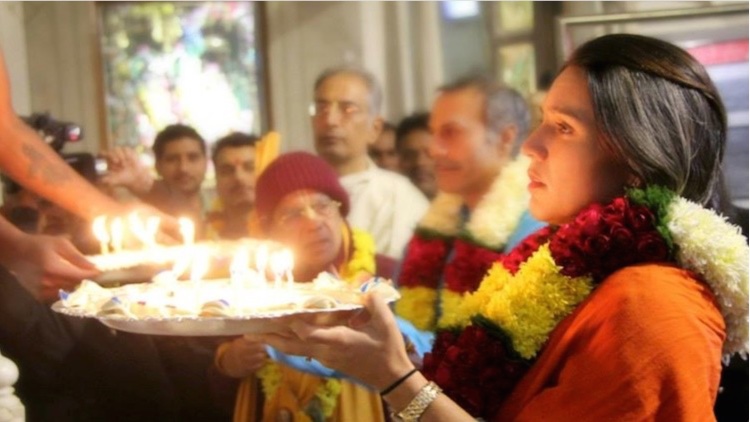Tulsi Gabbard Responds to ISKCON Bangladesh Attack
By Madhava Smullen | Дек 31, 2015

Congresswoman Tulsi Gabbard of Hawaii – the first Hindu congresswoman in America – has requested Marcia Bernicat, the U.S. Ambassador in Bangladesh, to visit an ISKCON temple there that recently withstood a terrorist attack.
She also urged the ambassador to put pressure on the Bangladeshi government to prosecute the attackers.
The assault took place at the ISKCON temple in the Kaharol region of Dinajpur on December 10th, during a gathering of over two thousand devotees.
According to Monsur Ali Sarker, officer-in-charge of Kaharol Police Station, five men on two motorbikes rode by and hurled a bomb, which did not explode.
“However, the attackers opened fire at the entrance, injuring two people,” said ISKCON general secretary of Bangladesh Caru Candra Das, who was present at the time.
The criminals then exploded two more crude bombs – which did not cause any further injuries — to make way for their escape, according to officer Sarker. However, locals caught one of them, Safayet Hossain, in possession of another makeshift bomb.
The attack was the fourth such incident within one month on followers of Hinduism in Bangladesh.
In the aftermath, the Hindu American Foundation requested Congresswoman Tulsi Gabbard to take action and bring more attention to this serious plight. ISKCON Minister of Communications and GBC member Anuttama Das also met with her on December 16th to discuss the problems and ask for her help.
Gabbard moved swiftly, corresponding with Bangladesh’s US Ambassador Marcia Bernicat on December 22nd.
“I am writing to you to express my alarm at the terrorist attacks on religious minorities in Bangladesh,” she said. “I urge you to visit the temples that were targeted in the most recent attacks, and request that you urge the government to ensure a thorough investigation of the attacks and fully prosecute those responsible.”
She also specifically mentioned ISKCON: “The two recent attacks against the Kantaji temples and the International Society for Krishna Consciousness (ISKCON) temple… have left dozens injured and are clear examples of the Islamic extremism against religious minorities that is growing in Bangladesh.”

ISKCON devotees form a human chain to protest the attack on their temple in Dinajpur, Bangladesh
She added: “There are many reports that… the government is not fulfilling its duty to investigate and prosecute those who are responsible for these horrific attacks on human rights. The government must take action to ensure that Bangladesh does not become a haven for Islamic extremists.”
Tulsi Gabbard concluded: “I ask that you visit these attacked temples, and meet with local leaders, such as the Bangladesh Hindu Buddhist Christian Unity Council, to show America’s commitment to the human rights of all in Bangladesh. Additionally, the embassy must urge the Bangladeshi government to make it a priority to bring the perpetrators of this violence to justice.”
Meanwhile for their part ISKCON devotees conducted peaceful marches across Bangladesh to bring the situation to the attention of the Bangladeshi government and the world.
Documents presented in April this year at the US Congressional Hearing on Religious Extremism in Bangladesh stated that within the broader Hindu community “more than 47 temples were destroyed and approximately 700-1500 homes vandalized or burned to the ground (estimates vary) at the beginning of 2013. In the aftermath of the violence, Amnesty International noted with concern that the Hindu community in Bangladesh was at extreme risk.”
A major part of that Hindu community, ISKCON has forty temples and 15,000 initiated devotees in the country. It also has an estimated up to 500,000 people worshiping at these temples during the year and 100,000 attending the annual Dhaka Rathayatra.
“This year alone marked several attacks in Bangladesh against temples, congregational gatherings and individuals simply due to their religious beliefs,” said Anuttama Dasa, Global Communications Minister for ISKCON. “We appeal to the Government of Bangladesh to address the growing intolerance towards minority communities and to safeguard the fundamental right of religious freedom for all as specified in the country’s constitution.”















